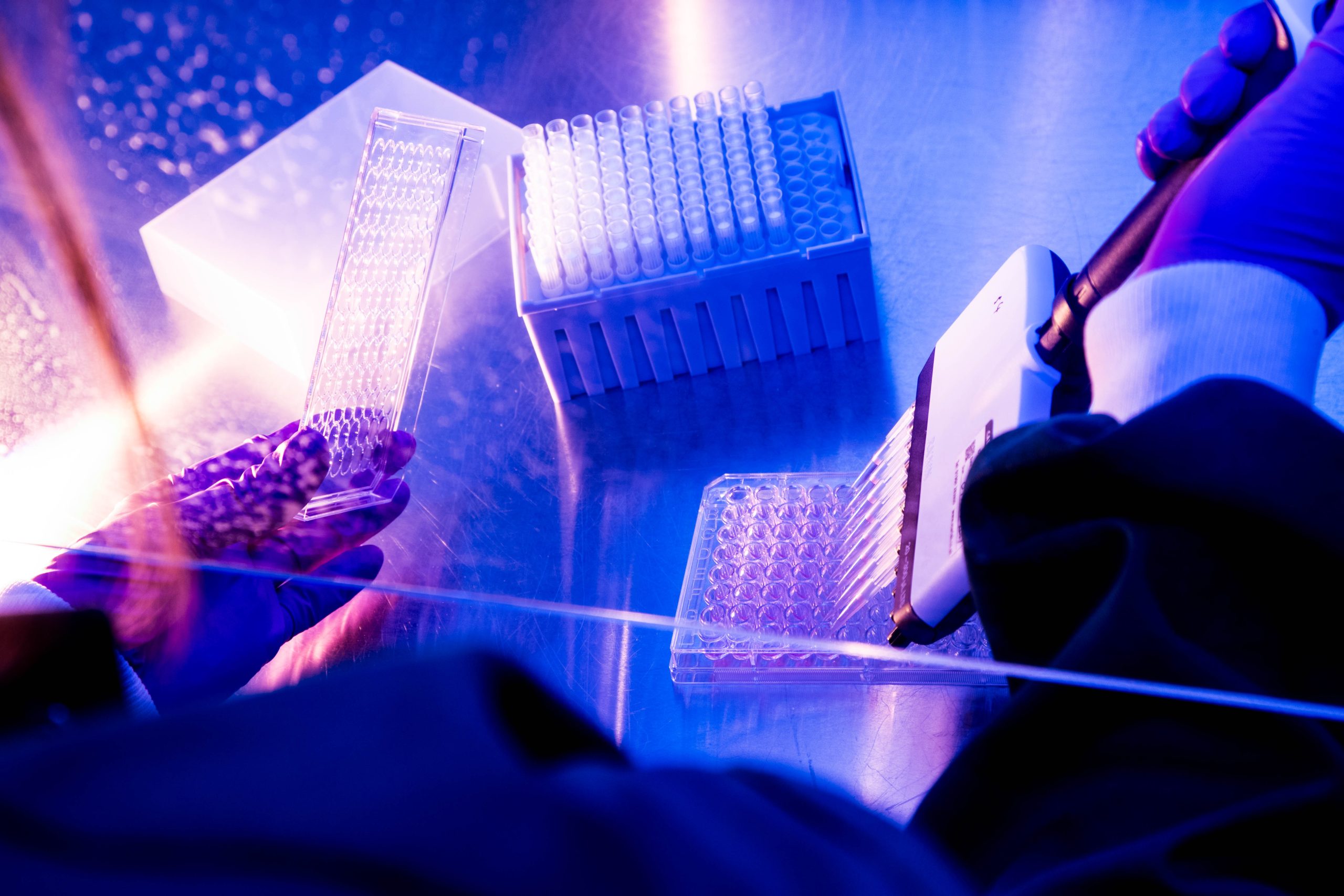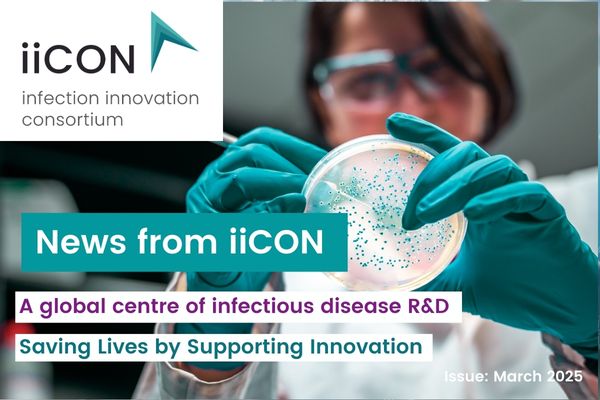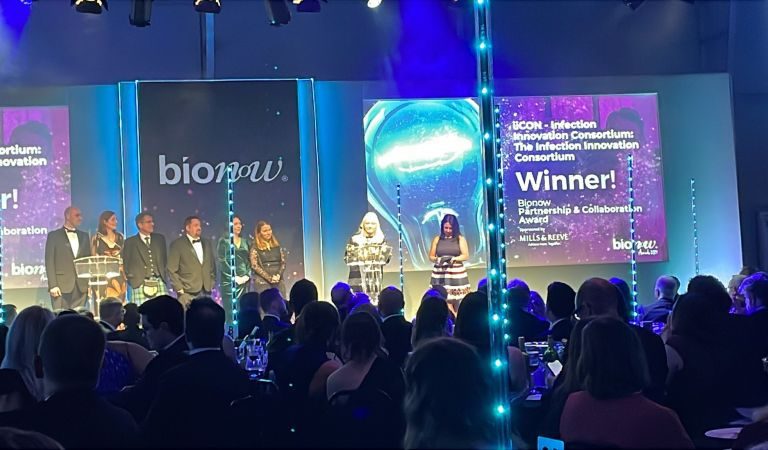- Join the Innovation Journey
- Our Platforms
High-Impact Funding and Collaborative Support in Advancing AMR Research

Infex Therapeutics, based at Alderley Park in the North West, like many small and medium-sized enterprises (SMEs) working to combat antimicrobial resistance (AMR), has faced challenges in securing investment, particularly during a difficult funding climate for the life sciences sector. The development of new antibiotics and infectious disease treatments has long been hindered by insufficient investment, long product development timelines, and the complex regulatory environment. However, iiCON’s model of collaborative, non-dilutive funding, alongside the expertise and resources provided by its partners, has provided Infex with the crucial resources needed to accelerate its R&D programmes and progress toward life-saving therapies.
iiCON is a joint venture between the Liverpool City Region Combined Authority and Cheshire & Warrington Local Enterprise Partnership (LEP).
Key Outcomes and Achievements:
- Infex’s Funded Programmes through iiCON
iiCON’s grants and collaborative support have played an essential role in helping Infex move forward with its promising treatments. To date, iiCON has contributed £4.5m in non-dilutive funding grants, which accounts for approximately 20% of Infex’s total programme funding. This non-dilutive funding has enabled Infex to advance its work on novel antimicrobial therapies without surrendering equity or control at an early stage. Infex’s funding has also benefitted the wider consortium, as trials have been run at Liverpool University NHS Foundation Trust, benefitting patients in the region.
- Critical Support for AMR SMEs
The funding landscape for SMEs focused on AMR and infectious diseases has been particularly challenging, with global investments in antibiotic research continuing to decline. iiCON has played a pivotal role, not only by providing high-impact support to Infex, but also by offering invaluable access to clinical trial expertise, infrastructure, and strategic partnerships. By bridging the skills and funding gap, iiCON has supported Infex’s ongoing work, enabling them to continue developing treatments for resistant infections that larger pharmaceutical companies often overlook.
- RESP-X – Clinical Readiness and Phase 1 Trials
One of Infex’s major programmes, RESP-X, focused on developing treatments for respiratory infections, was supported by iiCON in reaching a significant clinical milestone. This included access to key resources such as the University of Liverpool and Liverpool Royal Hospital Clinical Research Facility, expert clinical trial design guidance, and essential operational support. With iiCON backing, RESP-X reached a major milestone, entering Phase 1 clinical trials in healthy volunteers in Liverpool. The programme is now progressing into Phase 2a trials with non-cystic fibrosis bronchiectasis (NCFB) patients, marking a critical step toward addressing the urgent need for new therapies in AMR and respiratory infections.
- MET-X – Pre-Clinical Development
Another of Infex’s promising programmes, MET-X, which focuses on treating multidrug-resistant bacterial infections, also benefited from iiCON’s non-dilutive funding and its network of partners. iiCON’s support helped Infex reach a crucial stage in the MET-X programme – clinical candidate nomination – and move into pre-clinical development. This progression is vital for identifying viable drug candidates that could be developed into life-saving antimicrobial therapeutics.
- COV-X – From Hits-to-Leads to Pre-Clinical Development
The COV-X programme, focused on tackling COVID-19 and broad spectrum coronavirus infections, also received critical backing from iiCON. The programme progressed from hits-to-leads (the identification of potential drug candidates) with the aid of iiCON’s expertise, before receiving further funding from Innovate UK for candidate nomination. Additionally, the programme received grant funding from US Federal Government Agency, the National Institute of Allergy and Infectious Diseases (NIAID), for pre-clinical development, ensuring continued progress of the asset to tackle pandemic infections.
The Need for Continued Non-Dilutive Support
Infex’s successes underscore a fundamental need for continued non-dilutive funding for UK SMEs focused on AMR and infectious diseases. Such funding mechanisms are essential for bridging the gap between discovery and clinical development, ensuring that ground breaking research does not stall due to financial constraints.
Currently, there is a significant gap in clinical-stage non-dilutive funding mechanisms in the UK when compared to other regions like the EU and US. The lack of funding for early-stage clinical trials in the UK has made it difficult for many promising therapies to advance, putting the UK’s world-class science base at risk of stagnation. Infex’s experience highlights the importance of continued, targeted funding to sustain innovation and ensure the development of life-saving treatments.
Infex will need to raise a minimum of £20m over the next three years to continue advancing its programmes. Additional non-dilutive grants will play a crucial role in attracting private investment and ensuring that the company can continue its important work in the UK. The collaborative support of iiCON and its partners will be essential to this ongoing success.
Conclusion
The iiCON initiative and Infex Therapeutics’ collaboration exemplify the power of integrated support, expertise, and funding in tackling the global challenge of infectious diseases and AMR. Through iiCON’s high-impact funding, access to clinical infrastructure, and collaborative approach, Infex has also benefitted with their membership of the iiCON consortium, with clinical trials being run in Liverpool, retaining project spend in the UK with other iiCON partner organisations. The partnership continues to contribute to the UK’s leadership in global health innovation. Most importantly, patients in the North West, and in the rest of the UK, are the first in the world to receive RESP-X in trials to treat their serious chronic lung disease.


